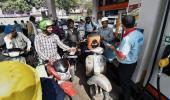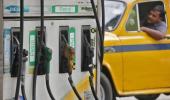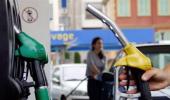'I have no problems with the finance ministry or with state governments treating petrol pump prices as the last resort for meeting their ambitious spending targets with very limited revenue resources.'
'But let's do away with this smokescreen of free pricing of petrol and diesel and go back to administered pricing regime,' says Dr Sudhir Bisht.

Let me first say that I realise that I have no option but to support the Government of India's decision to raise excise duties on petrol and diesel to support the serious economic crisis that our nation faces due to the challenging times caused by COVID-19.
Let me also unambiguously endorse the Delhi state government's decision of raising value added tax (VAT) on petrol and diesel rather sharply.
We are going through a very difficult phase and any decision that the government takes needs the full backing of its citizens.
However, I am also taking this opportunity to make a case for going back to the regime when the prices of petrol and diesel were fully regulated.
Every policy claim of the government should reflect in its practices on the ground.
The claim of petrol-diesel prices being entirely at the discretion of oil marketing companies (OMCs) falls very short by this parameter.
Petrol and diesel make up for 54% of the total sales of petroleum products in India and there is no way our economic challenges allow us NOT to tinker with the duties and taxes to make up for any shortfall in revenue targets.
The petrol-diesel combine is just a sitting duck for any finance minister gripped with the fear of missing on collection targets.
These two products appear as low hanging fruits and the minister can't be blamed if she just reaches out to pluck them without any sense of discomposure.
Let's examine the statement of Finance Minister Nirmala Sitharaman's Budget speech in 2019, when she increased the excise duty and cess on petrol and diesel.
She remarked, 'Crude prices have softened from their highs. This gives me room to review excise duty and cess on petrol and diesel. I propose to increase special additional excise duty and road and infrastructure cess each one by 1 rupee a litre on petrol and diesel.'
The minister simply forgot that oil prices are supposed to be linked to the pump prices and that was the essence when petrol-diesel prices were deregulated.
I am not blaming the finance minister for any misdemeanour, but I am only questioning the wisdom of blowing the trumpet of free pricing of petroleum products (POL products in short) when it is in reality frequently controlled by the GOI.
As per the ministry of petroleum and natural gas's petroleum planning and analysis cell, petrol and diesel fall in the category of 'major decontrolled products'.
Other POL products in this category are naphtha, aviation turbine fuel (ATF), light diesel oil (LDO), lubes & greases, furnace oil and bitumen.
Ever since the GOI announced abolition of administered pricing regime in respect of petrol and diesel in mid-2010, the prices of these two products have been anything but free.
As of today, the GOI and the governments of various states control about 55% of the petrol prices through the excise duty and VAT components respectively. In case of diesel, these two tax components add up to about 51% of the retail selling price in Delhi.
I quote from the FAQ section of PPAC Web site about the government's proclamation on how committed it is to the abolition of regulated pricing mechanism of petrol and diesel.
Q4. How are prices of Major petroleum products i.e. Petrol, Diesel, PDS Kerosene and Domestic LPG are decided?
Ans. The prices of petrol and diesel have been made market determined by the Government effective from 26th June, 2010 and 19th October, 2014 respectively and since then their prices are being decided by the Public Sector Oil Marketing Companies (OMCs) namely, Indian Oil Corporation Limited, Hindustan Petroleum Corporation Limited and Bharat Petroleum Corporation Limited, in line with the changes in the international market prices and other market conditions. The Public Sector OMCs not only increase but also decrease the prices accordingly.
Petroleum ministry officials say that petrol and diesel prices in India are dependent upon the international prices of these two products. However, the international prices of petrol and diesel are not published on the Web sites of the ministry or PPAC.
The Web sites only mention international crude oil prices. This is principally incorrect.
A comparison between the RSP of the two products in India with the international prices of these two finished products must be published every day by the ministry, if it indeed believes in its commitment to the customers of these products.
But let's just gloss over this aspect for now as crude oil prices form about 90% of the cost of finished petroleum products.
A study of crude oil prices versus the RSP of petrol and diesel has been done me for the past few months.
Table A: Average price of crude oil and RSP of petrol and diesel prices in Delhi

Note: The Indian basket of Crude Oil represents a derived basket comprising of Sour grade (Oman and Dubai average) and Sweet grade (Brent Dated) of crude oil processed in Indian refineries in the ratio of 75:25 approximately.
It can be seen from the table 'A' that the importance of crude oil price has lost its significance over the last one year.
In April 2019, the price of crude oil was 43% of the pump price of petrol in Delhi. This contribution has come down to 14% in April 2020.
The same decline is observed when crude oil price is compared as the percentage of overall pump price of diesel in Delhi. The cost of crude as compared to the pump price falls from 47% to 15% from April 2019 to April 2020.
So if the price of crude oil has lost its significance in deciding the RSP of petrol and diesel, what factors now contribute to it more significantly?
A look at Table 'B' will identify excise duty and VAT (fixed by the Union finance ministry and state government respectively) as the major components of pump prices.
In case of petrol, these two components form 55% of the overall price.
Similarly in case of diesel, excise duty and VAT form 51% of the overall price.
If 50% of the pricing component is something that is fixed by the Union and state governments, then that pricing can hardly be called as free pricing, especially when these two components are mended frequently.
The Delhi state government announced a major hike in VAT on petrol and diesel on May 5, 2020. The VAT on diesel has been hiked from Rs 10 per litre to Rs 16.26 per litre.
This is a 62.6% hike and appears unprecedented.
The VAT on petrol too has been hiked, from Rs 15.97 to Rs 16.44 per litre.
The Union government has been changing the excise duty component regularly in the recent past. In January 2020, the excise duty on petrol was Rs 19.98 per litre and on May 5 it stands at Rs 22.98 per litre.
Similarly on January 1, 2020, the excise duty on diesel was Rs 15.83 per litre and it is now at Rs 18.83 per litre.
Table B: Build-up of petrol price in Delhi
| Retail selling price (RSP) build up in Rs/Lt for Delhi PETROL | ||
| Element of RSP | 01-Jan-20 | 05-May-20 |
| Base price | 35.28 | 27.96 |
| Freight etc | 0.32 | 0.32 |
| Excise duty | 19.98 | 22.98 |
| Average dealer commission | 3.59 | 3.56 |
| VAT incl VAT on Dealer commission | 15.97 | 16.44 |
| Retail selling price (PSP) at Delhi- rounded | 75.14 | 71.26 |
Table C: Build-up of diesel price in Delhi
| Retail selling price (RSP) build up in Rs/ Lt for Delhi DIESEL | ||
| Element of RSP | 01-Jan-20 | 05-May-20 |
| Base price | 39.32 | 31.49 |
| Freight etc | 0.29 | 0.29 |
| Excise duty | 15.83 | 18.83 |
| Average dealer commission | 2.52 | 2.52 |
| VAT incl VAT on Dealer commission | 10 | 16.26 |
| Retail selling price (PSP) at Delhi- rounded | 67.96 | 69.39 |
From the data that I have submitted above, I hope that I have convinced readers that the pricing of petroleum products are not by any stretch of imagination dependent upon the international prices of crude oil.
Table 'D' explains how crude oil prices have become insignificant in deciding the final retail selling prices of petrol and diesel.
While crude oil prices dipped by 36% in March 2020 over February 2020, the pump price of petrol dipped by just 2%.
In April 2020, crude oil prices dipped by 39% plus but the pump price of petrol dipped by a mere 2.96%.
Table D: Growth in crude oil prices versus growth in pump price of petrol in Delhi
| Month | Growth of Indian crude basket in INR/per litre over previous month | Growth of RSP INR/per litre over previous month (petrol) |
| Apr-19 | 0.00 | 0 |
| May-19 | -0.88% | 0.37% |
| Jun-19 | -11.31% | -2.06% |
| Jul-19 | -5.38% | -1.65% |
| Aug-19 | 3.40% | 3.35% |
| Sep-19 | 3.91% | -1.09% |
| Oct-19 | -3.76% | 3.61% |
| Nov-19 | 5.39% | -2.35% |
| Dec-19 | 4.37% | 2.81% |
| Jan-20 | -1.69% | 0.31% |
| Feb-20 | -14.69% | -2.60% |
| Mar-20 | -36.43% | -2.02% |
| Apr-20 | -39.64% | -2.96% |
Another point that I would like to emphasise upon is the significance of contribution made by duties and taxes on POL products on central and state exchequers. Table 'E' below explains it very well.
Table E: Contribution of Petroleum sector to Central Exchequer

In the FY 2018-2019, the contribution of POL sector to the central exchequer was 2.79 lakh crore.
The total receipts (direct as well as indirect taxes, but without borrowings) by the Union government in FY 20182019 was Rs 16.65 lakh crore.
This means the POL sector contributed a whopping 16.75% to the total receipts of the Union government
The total GST collected in 2018-2019 in India was Rs 11.77 lakh crore.
In comparison, the sales tax/ VAT collected by various states on petroleum products in FY 2018-2019 was Rs 2.01 lakh crore.
It may be noted here that POL products are not under the scope of GST yet. VAT on petroleum products is thus about 17% in magnitude when compared to all GST collected by India.
How can a commodity that has an impact as high as 17% on the revenues of the Union government and state governments not be an object of micro management by our political masters?
I have no problems with the finance ministry or with state governments treating petrol pump prices as the last resort for meeting their ambitious spending targets with very limited revenue resources.
But let's just do away with this smokescreen of free pricing of petrol and diesel and go back to administered pricing regime.
Dr Sudhir Bisht, author and columnist, writes from New Delhi. He can be reached at Sudhir_bisht@rediffmail.com










